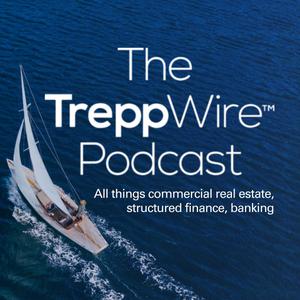
The Weekly Take from CBRE
CBRE
What matters most right now in Commercial Real Estate. Business leaders join economic, industry and subject matter experts to share their distinct views and latest thinking. The Weekly Take is hosted by Spencer Levy, CBRE’s Senior Economic Advisor and ...
- 52 minutes 17 secondsJust in Case: Insurance and the strategies of risk management
Industry experts address the critical topic of property and casualty insurance, a topic that is acutely relevant amid the devastating fires in Los Angeles. AON’s Ryan Barber, Walton Street Capital’s Raphael Dawson and CBRE’s Chris Nassa discuss approaches that can help commercial real estate owners manage risks and stem rising costs.
Share these insights from this week’s episode:
- Innovative Modeling: Property owners should adopt a sophisticated approach to risk management, using advanced tools and models to inform their insurance decisions.
- Captive Insurance: Owners with large portfolios should consider captive insurance and other programs to manage costs and realize profits.
- Data Accuracy: Providing detailed and accurate information about properties can significantly impact insurance modeling and premiums.
- Stay Informed: Companies should designate an in-house expert dedicated to staying informed about insurance market trends and innovations crucial for effective risk management.
20 January 2025, 9:00 pm - 37 minutes 56 secondsGeorgia on My Mind: Why global brands, tech talent and Hollywood are flocking to Atlanta
Hala Moddelmog of the Woodruff Arts Center and CBRE’s Nicole Goldsmith discuss Atlanta's economic and cultural development, highlighting the role of diverse talent, sports, the arts and entertainment and a welcoming business climate in its rise.
Share these insights from this week’s episode:
- Corporate support, cultural institutions and educational resources fuel Atlanta's economic development.
- The growing preference for mixed-use environments and high-amenity office spaces has attracted global brands and talent.
- Major sporting events like the 2026 FIFA World Cup and strategic urban development projects will continue to shape Atlanta's global standing.
- Addressing infrastructure challenges, particularly in the transit system, are key to supporting future growth.
- One of the most educated cities in the U.S., Atlanta’s ability to retain its diverse, highly skilled workforce is critical for sustained success.
13 January 2025, 9:00 pm - 46 minutes 30 secondsStronger: Two leading economists on what’s ahead for real estate in 2025
What will 2025 hold for the global economy and real estate? Selma Hepp, CoreLogic Chief Economist, and Richard Barkham, CBRE Global Chief Economist, discuss where they see opportunities and challenges and a few things to keep an eye on.
Share these insights from this week’s episode:
- Despite continued high interest rates, the economy is expected to perform well in the near term, driven by a resilient consumer.
- Housing sales are expected to remain subdued due to persistently high mortgage rates and ongoing affordability Issues.
- Real estate is at the beginning of a new cycle with retail and industrial particularly well positioned.
- Increased insurance costs and property taxes have exacerbated housing affordability challenges.
6 January 2025, 9:00 pm - 38 minutes 50 secondsInto the Mystic: WSJ’s ‘most accurate forecaster’ on where the economy is headed [encore - 06.10.24]
Back in June, Belinda Román, 2023’s most accurate forecaster, according to The Wall Street Journal, and CBRE Econometric Advisors’ Dennis Schoenmaker opine on the art, science and technology involved in predicting the ebbs and flows of the global economy.
Insights to Share:
- Belinda Román, Associate Professor of Economics at St. Mary’s University, expects GDP growth of 3% this year.
- CBRE EA’s Dennis Schoenmaker expects GDP to hover around 2%.
- Even with slower economic growth, there will be opportunities in commercial real estate.
- Regional, national and global forecasting requires a deep understanding of the available data.
- In commercial real estate, where information has historically been opaque, future forecasting can be enhanced by AI.
30 December 2024, 10:51 am - 21 minutes 14 secondsBack in Time: Reflections on 2024
It's that time of year - when we reflect on milestone moments of our fifth season. 2024 had some major themes including artificial intelligence's impact on commercial real estate, office conversions, evolving market conditions—and re-examine them all, as well as take our beginning-of-the-year economic forecasts to task to see how it turned out.
23 December 2024, 10:51 am - 30 minutes 31 secondsWide Open Spaces: Shaping the Future of Dallas
Dallas is a dynamic, fast-evolving city whose diversified economy and business friendly policies make it an attractive place for investors and companies. Longtime Dallas developers Lucy Billingsley and Lucy Burns offer insights into the city’s future.
Share these insights from this week’s episode:
- Dallas offers plentiful industrial and multifamily real estate opportunities thanks to its rapid growth and economic diversification.
- Investors and businesses benefit from Dallas' pro-business policies and relatively low tax burdens.
- Demand for convenience and amenities is driving the trend toward master-planned communities that offer live-work-play environments.
- Dallas’s growth hinges on continuing infrastructure investment, including transportation and public services to support its expanding population.
16 December 2024, 9:01 pm - 24 minutes 31 secondsUnwritten: Secrets to a thriving CRE career
Commercial real estate offers many different career paths. Learning how to overcome challenges and finding the right mentors are key to success in all of them. Trailblazing executives including Laura Clark (Rexford Industrial), Barbara Perrier (CBRE) and Elisabeth Troni (CBRE Investment Management) shared personal anecdotes and sage advice during CBRE’s recent Power of WE conference.
Share these insights on pillars of a successful CRE career:
Lead with integrity:
- Making decisions that may be contrary to your immediate financial gain builds trust and loyal, long-term clients.
Seek out mentors and feedback:
- Mentorship is crucial for career development and informal feedback fosters skill enhancement.
Challenge the status quo:
- Questioning traditional norms can lead to progress and achievement. Say yes to new challenges and opportunities.
Balance flexibility with visibility in the workplace:
- Flexible work arrangements can be beneficial, but being present in your professional environment is also key to advancement.
Favor unity over separation of your work-life:
- Completely separating professional and personal time is hard, whereas embracing work-life unity means emphasizes purposeful engagement while in both spheres.
9 December 2024, 9:00 pm - 38 minutes 47 secondsOn Top of The World: Mary Ann Tighe on the future of real estate in New York City
Mary Ann Tighe, CEO of CBRE's New York Tri-State Region, discusses Manhattan's ongoing transformation. Drawing on decades of commercial real estate deal-making experience, Mary Ann discusses the resurgent office leasing market, office-to-residential conversions and long-term opportunities.
- Anticipated Market Transformation: Investors should prepare for a major shift in New York’s office market, reminiscent of the historic changes that occurred in the 1920s.
- Long-Term Leases: Despite the rise of remote work, many New York City businesses want to sign long-term leases due to the high costs and complexities of space renovation.
- Investment Opportunities: New York has significant opportunities to convert antiquated office buildings into residential or mixed-use properties.
- Government Incentives: Understanding and leveraging government tax incentives can be crucial in making redevelopment projects financially viable.
- Cultural Edge: New York's creative energy and foremost cultural and social amenities remain a strong draw for people, businesses and capital. This enables the City's resilience and continuous evolution.
2 December 2024, 9:00 pm - 36 minutes 8 secondsThe Points Guy on maximizing brand loyalty programs [Encore - 7/22/24]
Over 12 million people a month check The Points Guy for tips on making the most of their travel experiences. Brian Kelly, TPG himself, teams up with CBRE’s Hotel Research lead Rachael Rothman to explore the latest trends in loyalty programs, what hotel brands can learn from airlines and credit cards, and how you can get into that airport lounge.
Insights to Share:
- Loyalty programs are growing in importance to operators of hotels, airlines and credit cards, many of whom have partnered to increase brand awareness and reach.
- The proliferation of loyalty program participation is, in some cases, diluting the benefits, but savvy consumers can maximize points by having flexible travel dates and using websites such as point.me to compare redemption value at different airlines and hotels.
- One way to create brand loyalty is to provide flexibility and a customized experience. Instead of waiting until guests arrive, hospitality brands should reach out in advance and offer access to local guides, spas and restaurants.
25 November 2024, 9:00 pm - 37 minutes 38 secondsWhere We Are: AI, tech employment and office demand
Two tech talent experts—New Enterprise Associates’ Darcy Casarella and CBRE’s Colin Yasukochi—discuss where to find highly skilled tech workers, the role of venture capital in shaping tech hubs and AI’s influence on office space demand.
Share these insights from this week’s episode:
1. Strategic Location Strategy: Emerging tech markets in the Midwest and Southeast can offer significant cost advantages with their growing tech talent pools.
2. AI and Talent Focus: Prioritizing AI capabilities to drive innovation and growth will mean finding and upskilling talent quickly across both tech and non-tech companies.
3. Concentrated Venture Funding: Venture firms are creating a network effect by investing in new businesses in traditional tech hubs like San Francisco and Manhattan. Understanding the flow of venture capital can help predict the cities in which real estate demand will grow.
18 November 2024, 9:45 pm - 38 minutes 3 secondsMovin' On Up: Strategies driving Northern Virginia’s growth
Regional economic development leader Victor Hoskins and CBRE’s Cathy Delcoco discuss Northern Virginia’s opportunities and challenges as well as its thriving real estate market.
Share these insights from this week’s episode:
· Northern Virginia is benefiting from substantial job growth, especially in the technology sector, including AI-related roles. Tech job growth supports demand for office space and housing.
· High-quality, amenity-rich office space is seeing strong demand. Tenants are willing to pay a premium for Class A trophy buildings with amenities, despite downsizing due to hybrid work.
· Older office buildings are being redeveloped into residential units or data centers. This represents an attractive buying opportunity for nimble investors.
11 November 2024, 9:00 pm - More Episodes? Get the App
Your feedback is valuable to us. Should you encounter any bugs, glitches, lack of functionality or other problems, please email us on [email protected] or join Moon.FM Telegram Group where you can talk directly to the dev team who are happy to answer any queries.
 Capital Allocators – Inside the Institutional Investment Industry
Capital Allocators – Inside the Institutional Investment Industry
 The FORT with Chris Powers
The FORT with Chris Powers
 The TreppWire Podcast: A Commercial Real Estate Show
The TreppWire Podcast: A Commercial Real Estate Show
 The Walker Webcast
The Walker Webcast
 America‘s Commercial Real Estate Show
America‘s Commercial Real Estate Show